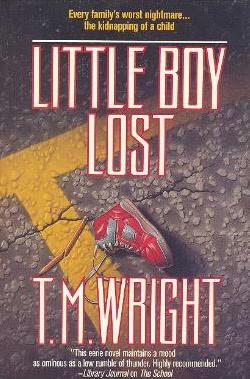I can only imagine what readers expecting the type of Mary Higgins Clarke-esque kidnapping potboiler suggested by Tor’s cover art and tagline—“Every family’s worst nightmare: the kidnapping of a child“—might have made of this bizarre novel. It does indeed involve a (possible) kidnapping, and begins, as you might expect, with a police inquest into the circumstances of the disappearance. Yet the proceedings become increasingly weird and idiosyncratic, and no wonder: this is a T.M. Wright novel. Wright of course specializes in odd novels like THE ISLAND and BLUE CANOE, and LITTLE BOY LOST is a worthy, and very characteristic, addition to his repertoire.
The opening chapters may be somewhat conventional, but do nonetheless hint at the weirdness to come in their unpredictable juxtaposition of various time frames, with a psychologist’s interview with a witness to the disappearance—headlined “WHAT HAPPENED THE DAY AARON GOT LOST”—interspaced with other characters’ recollections. This device initially seems gratuitous and off-putting, but once one adjusts to the novel’s odd rhythms the intercutting actually comes to make a weird kind of sense.
Said disappearance occurs in a shopping mall parking lot in upstate New York, where young Aaron is snatched out of the back seat of his father’s car by what appears to be his stepmother Marie—who herself disappeared a year earlier. As if that weren’t enough, Aaron’s mother was previously murdered by an unknown assailant. The police naturally suspect Aaron’s father Miles was behind the killing and subsequent disappearances, and Aaron’s brother C.J. is subjected to the abovementioned interview.
All this is but a setup for the dreamlike horrors to come, as Miles and C.J.’s reality gradually dissolves. They increasingly find themselves in a prehistoric landscape of arcane rituals and sacrifice, populated by shadowy and malevolent figures. The supernaturally endowed Marie, it transpires, is at home in this otherworldly landscape, although Aaron most definitely isn’t.
What resonates about this novel are its many quirky details, such as the precocious C.J.’s penchant for blurting out random details about where he’s been and what he’s seen to anyone who will listen. Even more impacting is the sheer mind-scraping eeriness of Wright’s horrors, and the vivid yet spectral atmosphere of rural menace. As is his custom, Wright keeps the explanations to a minimum, with the emphasis on immersive low-key horror of a type only he can provide.

